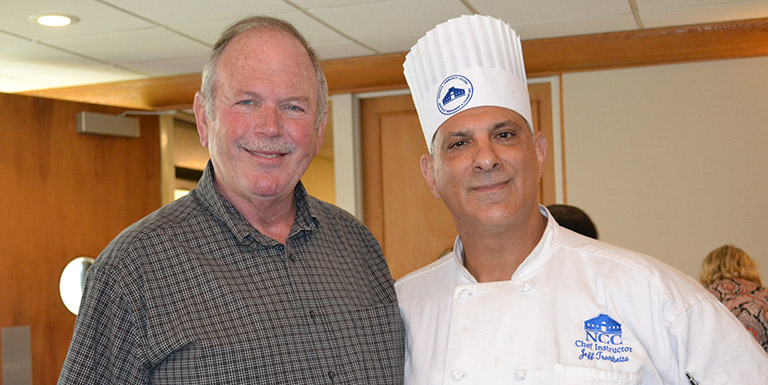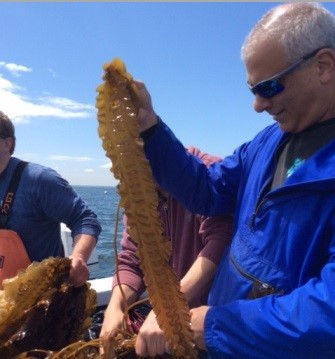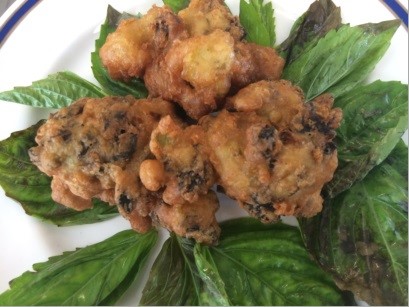Norwalk Community College: Promoting Kelp as Sustainable Food

Move over kale; the latest trendy vegetable comes from the sea. It’s kelp!
Kelp is a slippery brown seaweed that grows in shallow waters along coastal areas. This unlikely ingredient is on the menu at Norwalk Community College (NCC), where the Hospitality Management and Culinary Arts programs have partnered with marine biologist Charles Yarish, Ph.D., to harvest kelp for research and to promote its nutritional benefits.
Kelp is a powerhouse of vitamins and minerals. It is used in many Asian cuisines and contains the highest natural concentration of calcium of any food source. It’s also high in iodine and a natural source of antioxidants.
Dr. Yarish may be kelp’s biggest cheerleader. A professor in the Departments of Ecology/Evolutionary Biology and Marine Sciences at the Stamford branch of the University of Connecticut, Yarish has been studying kelp for 40 years. For the past two years, NCC students have helped him harvest kelp from Long Island Sound, a nearby tributary of the Atlantic Ocean.

NCC Professor Jeff Trombetta holds freshly harvested kelp. (Photo credit: Jeff Trombetta)
NCC students also serve kelp in a variety of dishes at campus events and use it to thicken sauces and give a flavor boost to foods. They recently developed 100 original recipes for kelp—everything from Fried Kelp Fritters to Kelp Frittata and Kelp Pizza.
“We put kelp in everything you can think of because it goes with everything—chili, popcorn, stir fries, fillings, sauces, and relishes,” said NCC Culinary Professor and Chef Jeff Trombetta.
“In May, we harvested 850 pounds for the summer kelp processing class to work on,” Trombetta said. “We are processing this kelp for sale in the New York and Connecticut markets. This is cutting-edge and the epitome of aqua farm-to-table.”
The partnership between the two Connecticut colleges came about in 2014 after a NCC culinary class catered a party celebrating the launch of The Maritime Aquarium at Norwalk’s new research vessel, the R/V Spirit of the Sound. Professor Yarish met Professor Trombetta there and invited NCC students and faculty to tour his research laboratory.
“We learned about the scientific reasoning behind cultivating kelp—which is to reduce the nitrogen and phosphorus levels of the Long Island Sound by growing it on the surface of the water, above oyster beds,” Trombetta said.
Soon Trombetta was visiting local aqua farms to see how kelp was raised, and spreading the word that kelp is the power food of the future. That’s when NCC students got involved in what’s known on campus as the Kelp Project.
“Dr. Yarish has been generous in appointing our Hospitality Program the culinary responsibility of advocating this edible seaweed product,” Trombetta said. NCC was challenged to teach people how to cook kelp and to educate other chefs about using it as an ingredient.
Kelp grows on 100-150 meter long ropes suspended above oysters on the water’s surface. About 15 pounds of kelp is produced per linear foot of line. After harvesting, the kelp is washed and cut into plant ribbons the size of fettucine noodles. Then it’s blanched in boiling water and frozen. The kelp starts out brown and turns bright green after blanching.
The processed kelp is returned to the aquafarmers, who sell it to their customers. NCC distributes free samples to local chefs to encourage them to try it in dishes.
The kelp noodles can be chopped and mixed into other vegetables and stuffings, or left whole and used to wrap pieces of fish, chicken, beef, corn on the cob, or even hot dogs.
In February, NCC’s Culinary students served kelp-based dishes to Connecticut legislators at the college’s annual Legislative Breakfast. (The politicians gave it a thumbs-up.) Faculty and students got to try the seaweed in April at the college’s Wellness Fair. (They preferred kale chips.)
As a result of NCC’s role in promoting kelp as a sustainable food source, Connecticut Senator Chris Murphy chose NCC as the venue for a Public Forum on Aquaculture in May. The senator met with local environmentalists and aquafarmers to discuss ways to preserve the local waterways, which provide food, recreation, and jobs for many residents.

A plate of Kelp Fritters prepared by NCC Culinary students. (Photo credit: Jeff Trombetta)
Marine biologists have found that kelp farming removes excess nitrogen and carbon dioxide from coastal water and prevents algae blooms that can cause fish and crustaceans to die off. Medical researchers are studying kelp’s potential immune-stimulating and anticancer properties, according to the National Institutes of Health. And someday, that vegetable on your dinner plate could be a sea vegetable.
“By distributing kelp to potential users and employers of NCC students, we show how innovative, dynamic, and forward-thinking NCC can be,” Professor Trombetta said.
Lead image: Dr. Charles Yarish and Professor Jeff Trombetta (Photo credit: Richard Leonard)
Madeline Barillo is Director of Marketing and Public Relations at Norwalk Community College.
Opinions expressed in Member Spotlight are those of the author(s) and/or submitting college and do not necessarily reflect those of the League for Innovation in the Community College.










